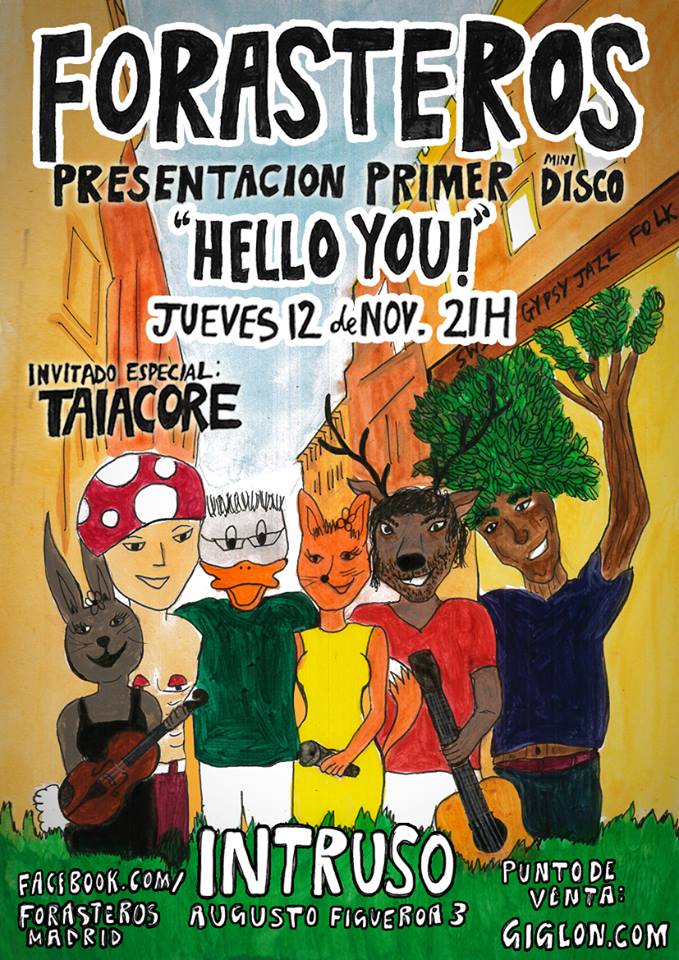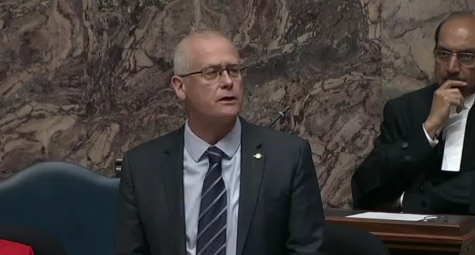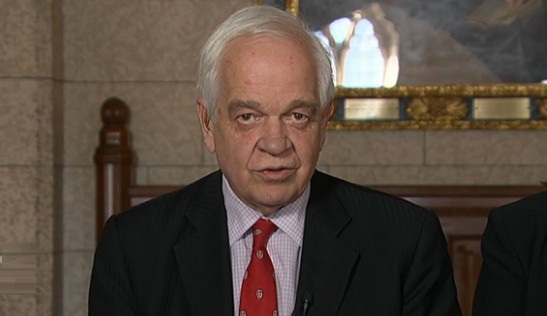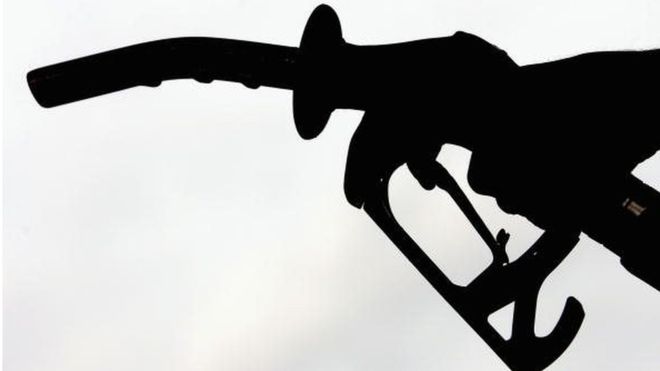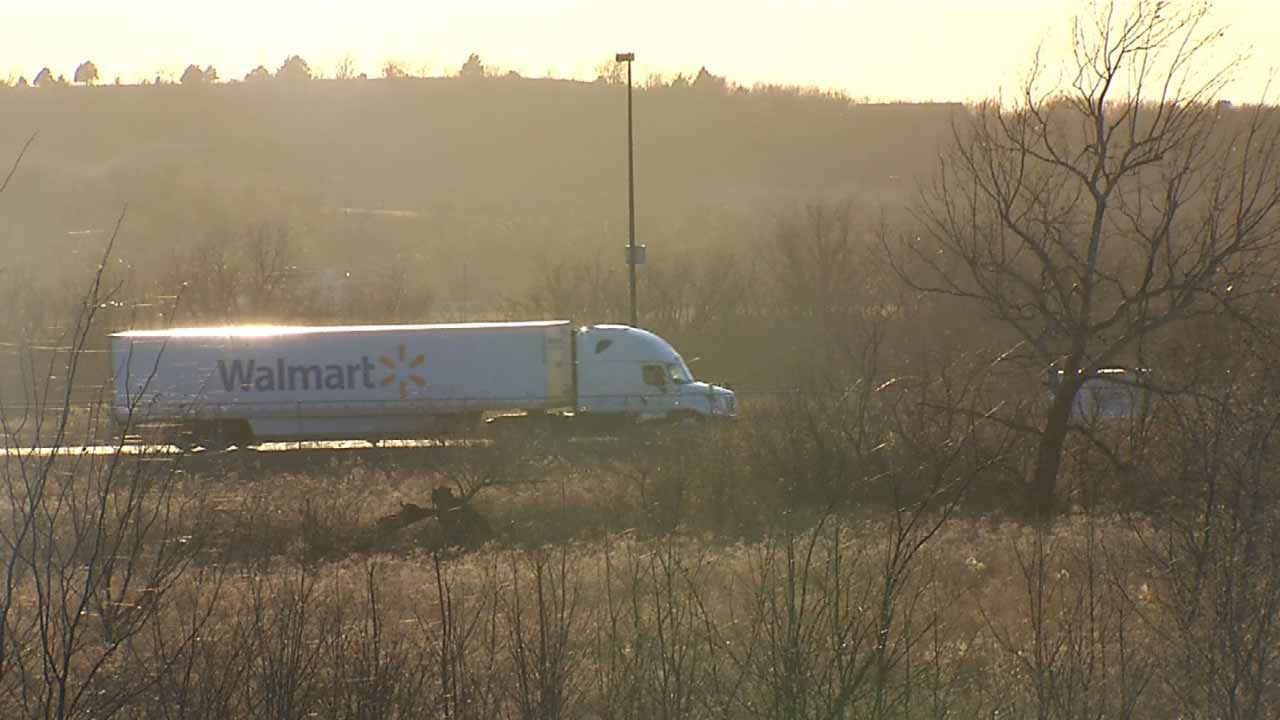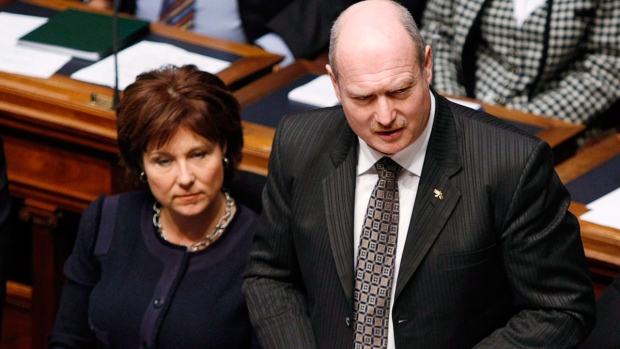The Parque del Buen Retiro is home to the imperial statues of a lost Madrid and the heaving throngs of the present day Spanish capital, from the puppeteers to the balladeers, this great oxygen bank has opened its gates in much same way that they city has opened its metaphorical ones – to people from all over world
The World Press Photo Exhibition Tour – ‘Inspiring. Engaging. Educating. Supporting.’
The World Press Photo exhibition tour that showcases award-winning photographs is the most popular traveling photo event in the world.
Each year, over three and a half million people worldwide go see the images of this prestigious annual press photography contest. The 2016 touring exhibition featuring the winners and finalists will open in Amsterdam on 16 April. The photos will then be exhibited in more than a hundred cities in 45 countries.
Since its creation in 1955, World Press Photo rewarded many impactful images – the mutilated face of a Rwandan man at a Red Cross hospital, a naked girl running after a napalm attack in Vietnam or a Buddhist monk setting himself on fire – that have established styles in visual storytelling or have become iconic.
Through this annual contest, the World Press Photo foundation strives “to inspire, engage, educate, and support both visual journalists and their global audience” while promoting and securing freedom of information and freedom of speech.
Centered as much on the aesthetic and the technical as on the journalistic aspects of the images, the selected images present the reality of current issues and expose the beauty of life in 8 categories: Contemporary Issues, Daily Life, General News, Long-Term Projects, Nature, People, Sports, and Spot News.
This year, 5,775 photographers from 128 countries submitted a total of 82,951 images for judging. At the end of the selection, 41 photographers from 21 countries were awarded by the jury. The refugee crisis in Europe, the war in Syria and the Paris attack were among the entries.
The 2016 award ceremony will be held in Amsterdam on 22 and 23 April.
2016 : Syrian refugees for the World Press Photo of the year
The jury of the 59th annual World Press Photo Contest selected Hope for a New Life – a photography by Australian photographer Warren Richardson as the World Press Photo of the Year 2015.
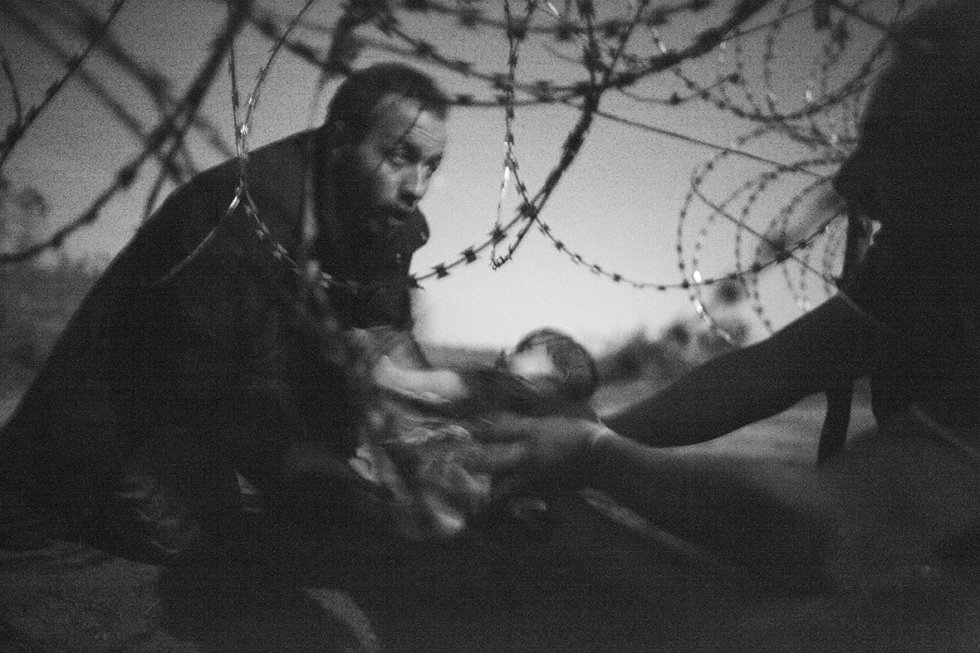
Hope for a New Life shows refugees about to cross the border from Serbia into Hungary. Taken at night on 28 August 2015, this man and child were part of a movement of people trying to cross into Hungary before a secure fence on the border was completed.
Richardson brought additional information about his telling image: “I camped with the refugees for five days on the border. A group of about 200 people arrived, and they moved under the trees along the fence line. They sent women and children, then fathers and elderly men first. I must have been with this crew for about five hours and we played cat and mouse with the police the whole night. I was exhausted by the time I took the picture. It was around three o’clock in the morning and you can’t use a flash while the police are trying to find these people, because I would just give them away. So I had to use the moonlight alone.”
In a press release from World Press Photo, jury chair and photo director of Agence France-Presse Francis Kohn said about the image: “Early on we looked at this photo and we knew it was an important one. It had such power because of its simplicity, especially the symbolism of the barbed wire. We thought it had almost everything in there to give a strong visual of what’s happening with the refugees.”
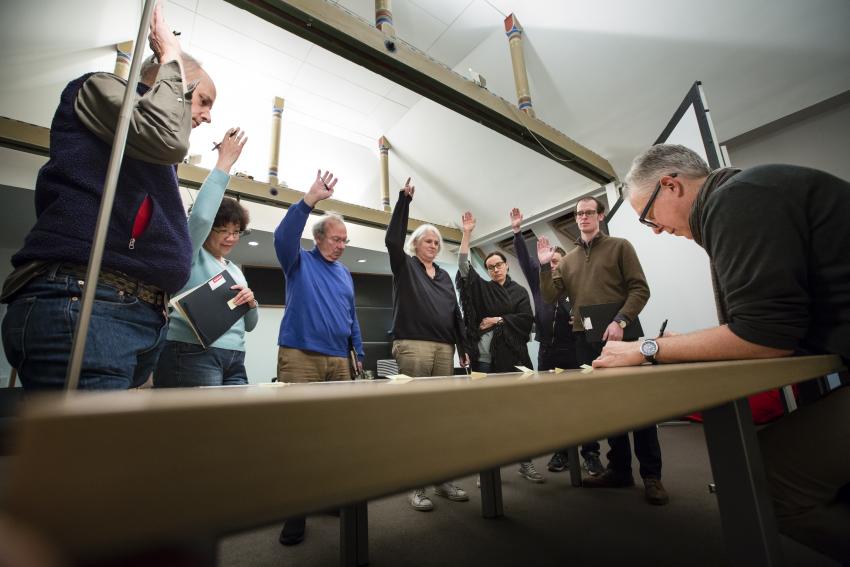
General News, 1st prize stories : Sergey Ponomarev
Reporting Europe’s Refugee Crisis.
Refugees arrive by boat on the Greek island of Lesbos.
November 16, 2015
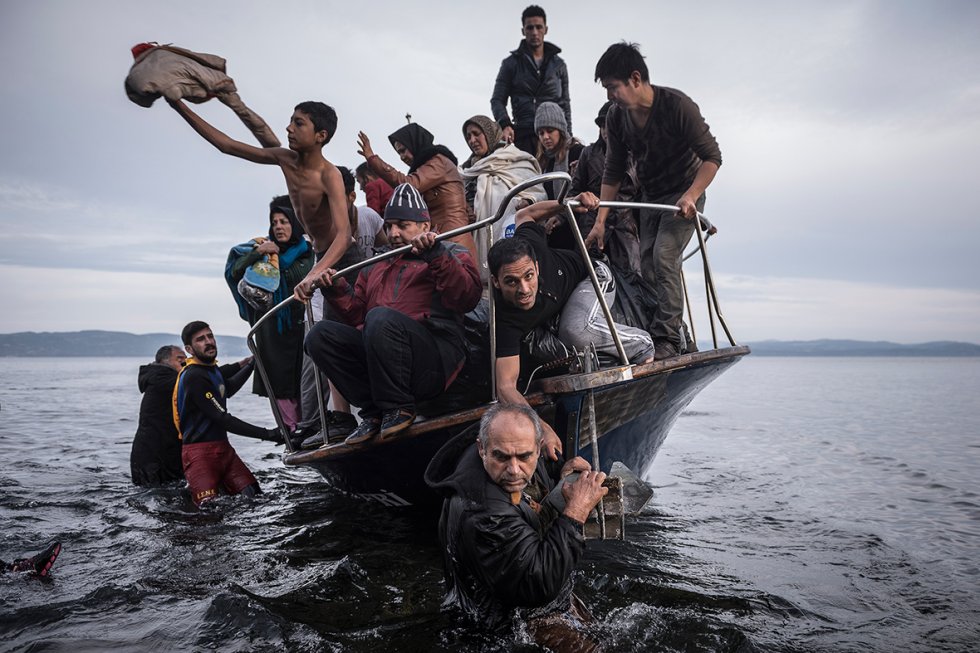
A man struggles to board a train headed to the Croatian capital Zagreb, in Tovarnik, a town near the border with Serbia.
September 18, 2015
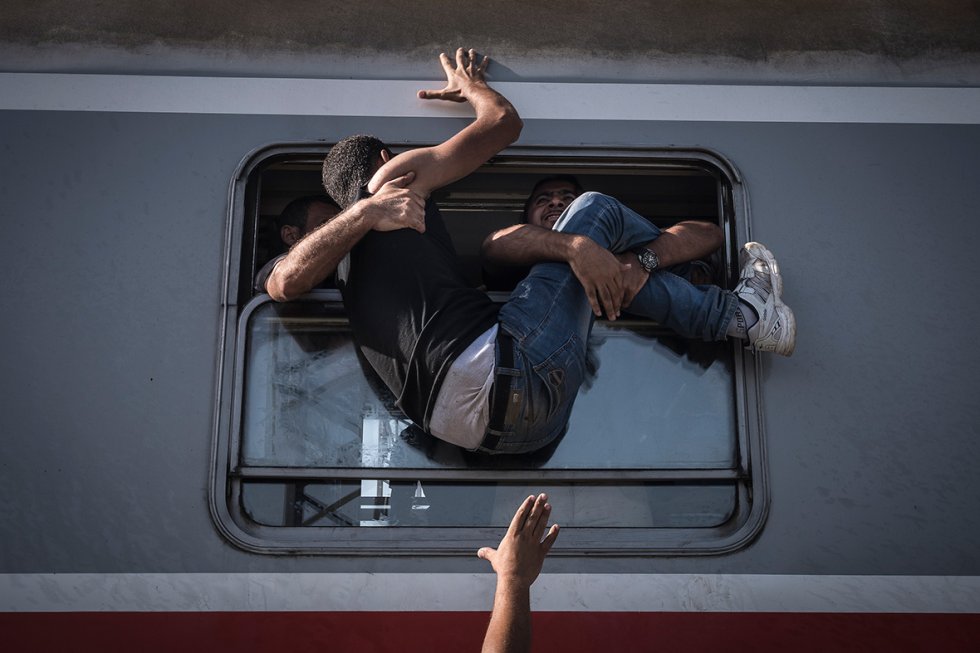
Spot News, third prize stories : Bulent Kilic
Broken Border.
People cross into Turkey through a broken fence, near the official border crossing at Akçakale. Akçakale and the Syrian town of Tel Abyad are directly adjacent to each other, with the border running through the middle.
June 14, 2015.
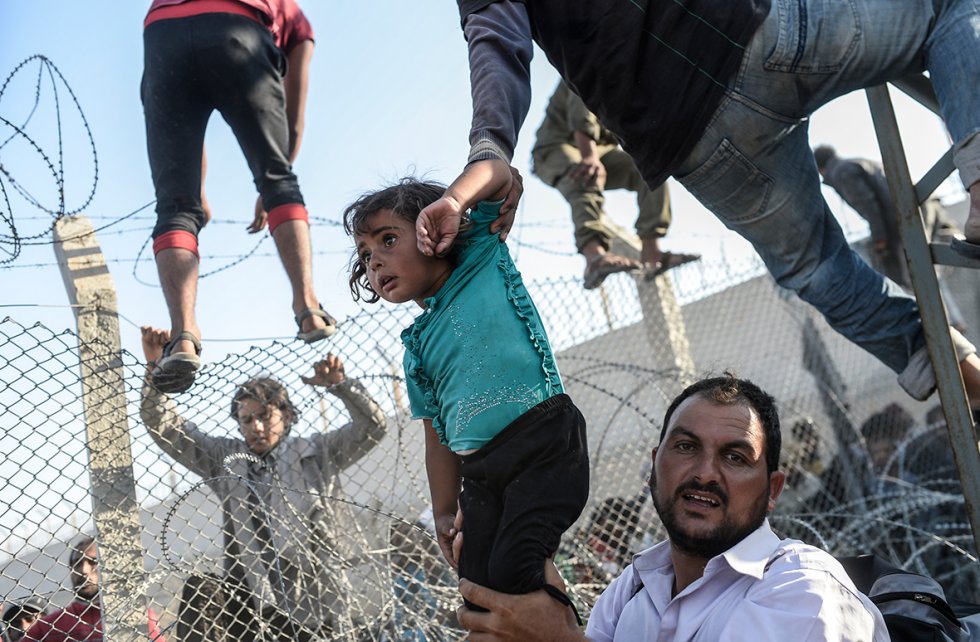
Refugees pass through broken border fences and trenches to enter Turkish territory.
June 14, 2015
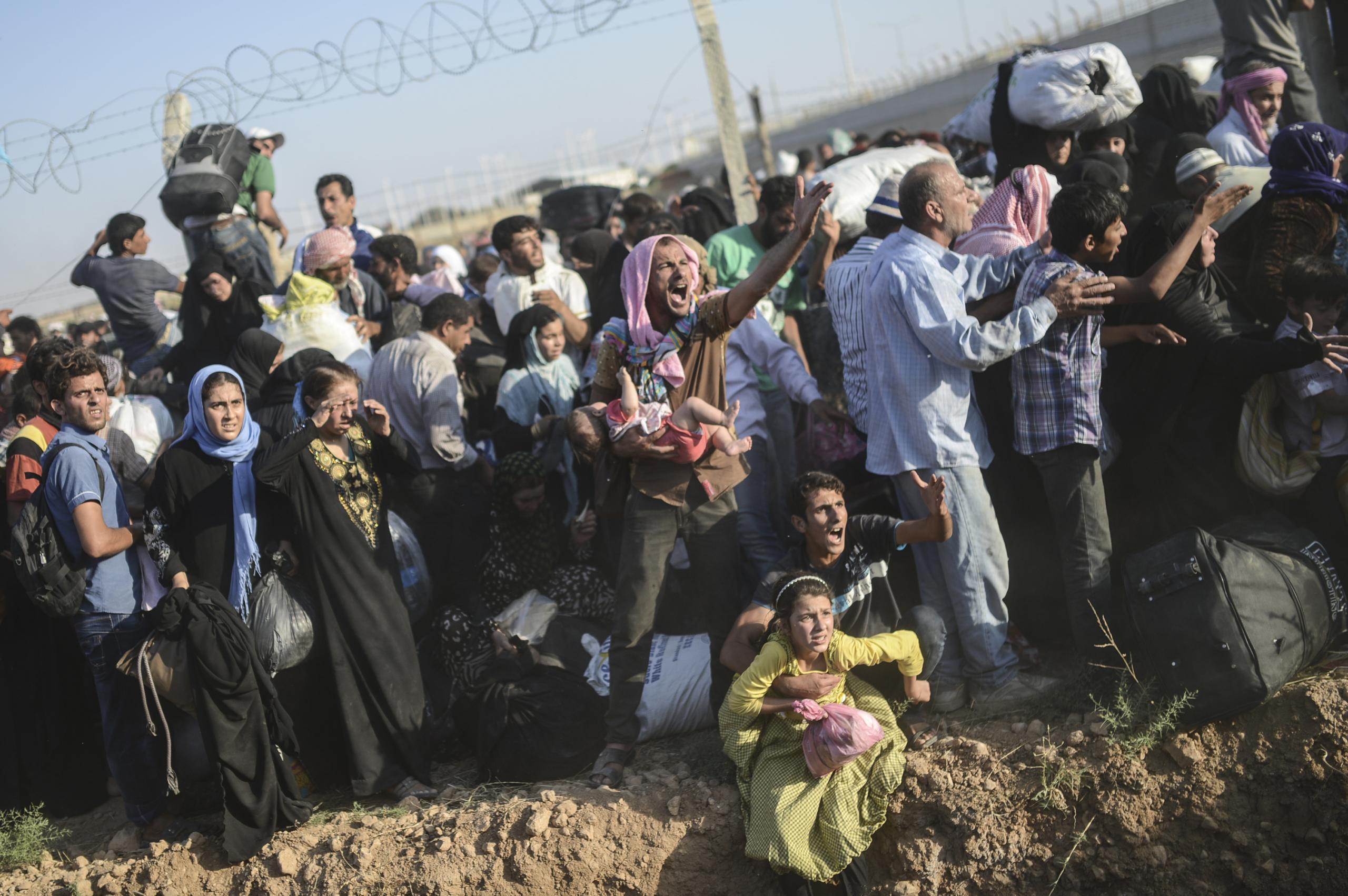
Contemporary Issues, 1st prize singles : Zhang Lei
Haze in China.
Tianjin, an industrial and logistics hub in northeastern China shrouded in haze.
December 10, 2015
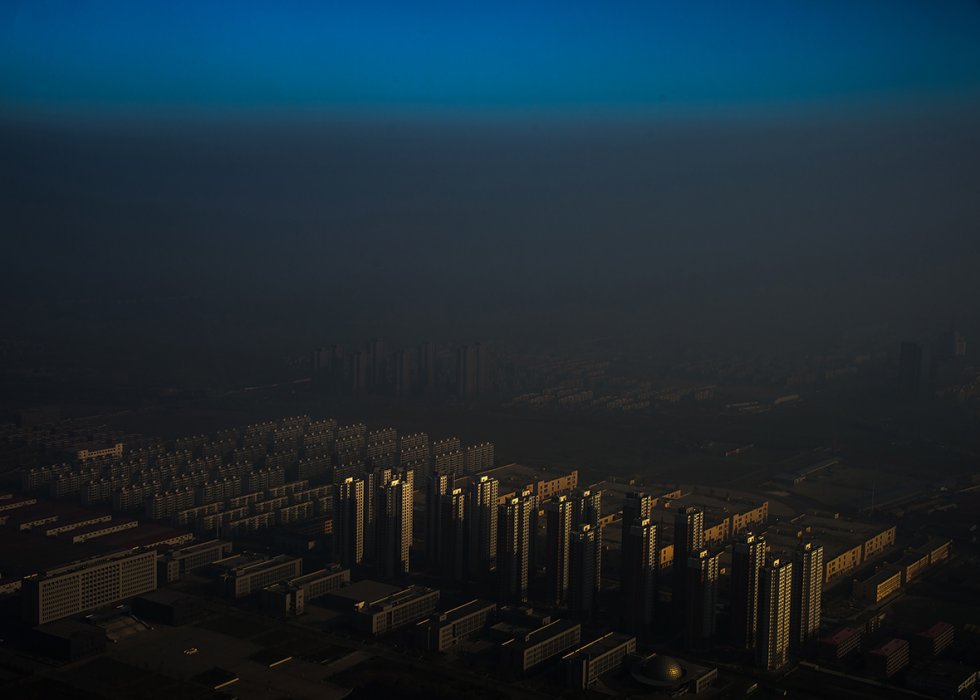
Contemporary Issues, 1st prize stories : Màrio Cruz
Talibes, Modern-day Slaves.
Series portraying the plight of Talibes, boys who live at Islamic schools known as Daaras in Senegal. Abdoulaye, 15, is a talibe imprisoned in a room with security bars to keep him from running away.
May 18, 2015
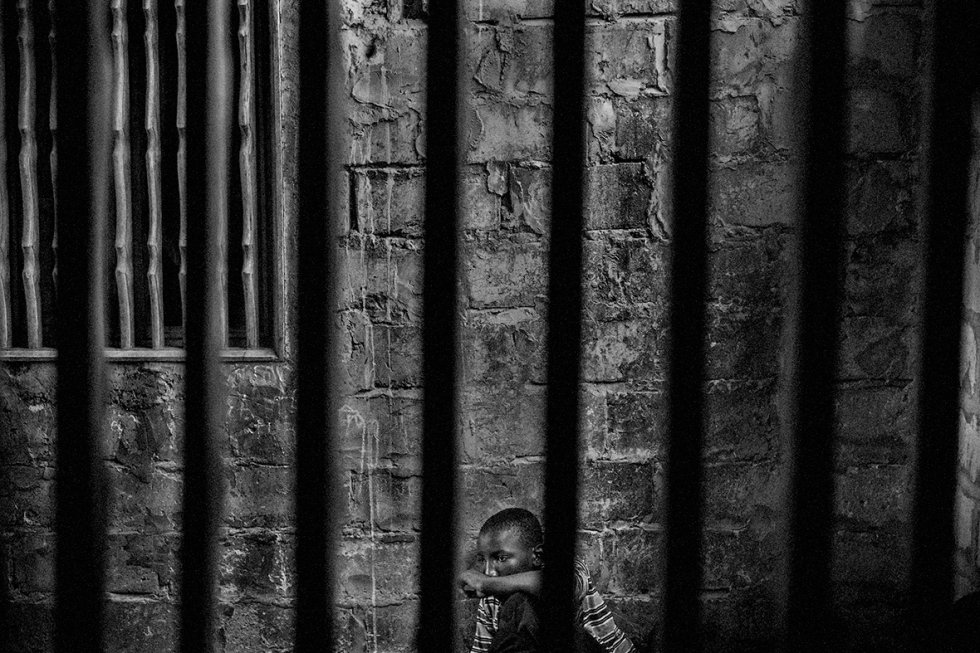
Daily Life, 1st prize singles : Kevin Frayer
China’s Coal Addiction.
Chinese men push a tricycle through a neighborhood next to a coal-fired power plant in northern Shanxi province. A heavy dependence on burning coal for energy has made China the source of nearly a third of the world’s CO2 emissions.
November 26, 2015
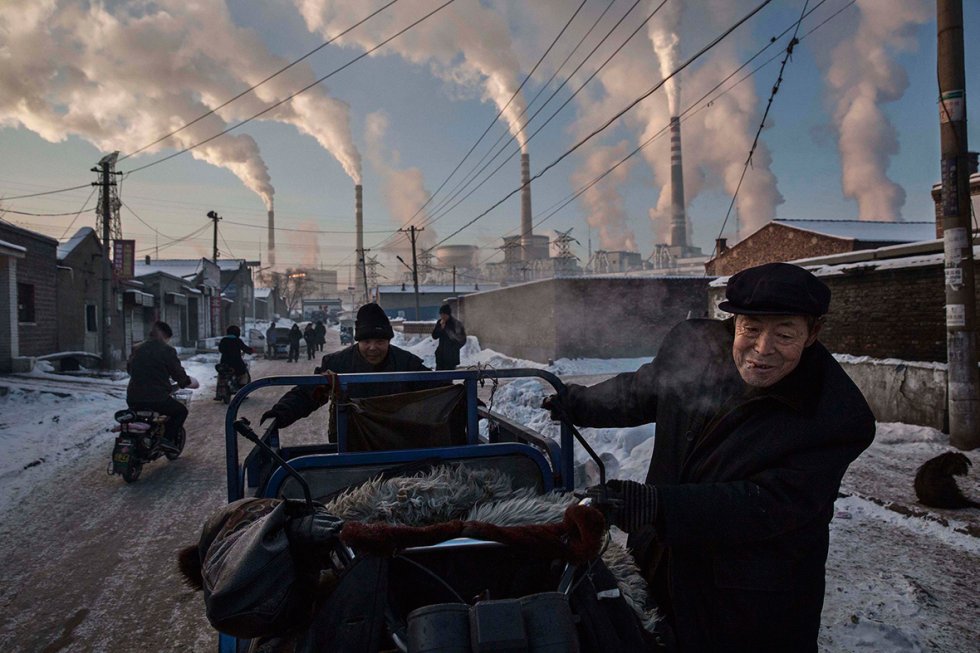
General News, 1st prize singles : Mauricio Lima
IS Fighter Treated at Kurdish Hospital.
Doctor rubs ointment on the burns of Jacob, a 16-year-old fighter from the group calling itself Islamic State (IS) at a hospital in Al-Hasaka, northern Syria.
August 1, 2015
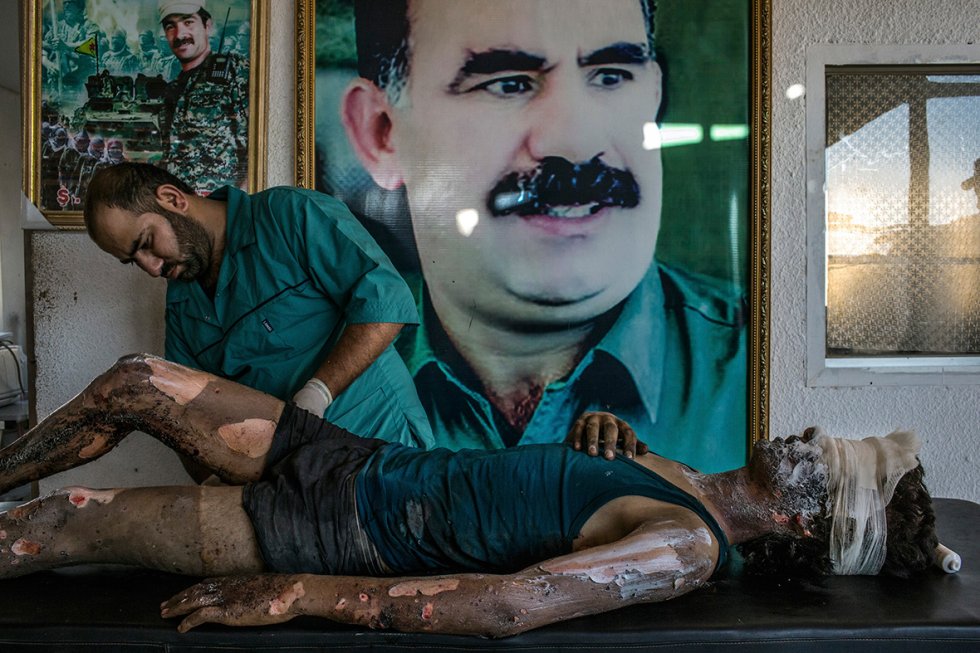
General News, second prize singles : Paul Hansen
Under the Cover of Darkness.
Volunteers assist refugees arriving on the Greek island of Lesbos, after crossing by boat from Turkey under cover of darkness to avoid detection.
December 6, 2015
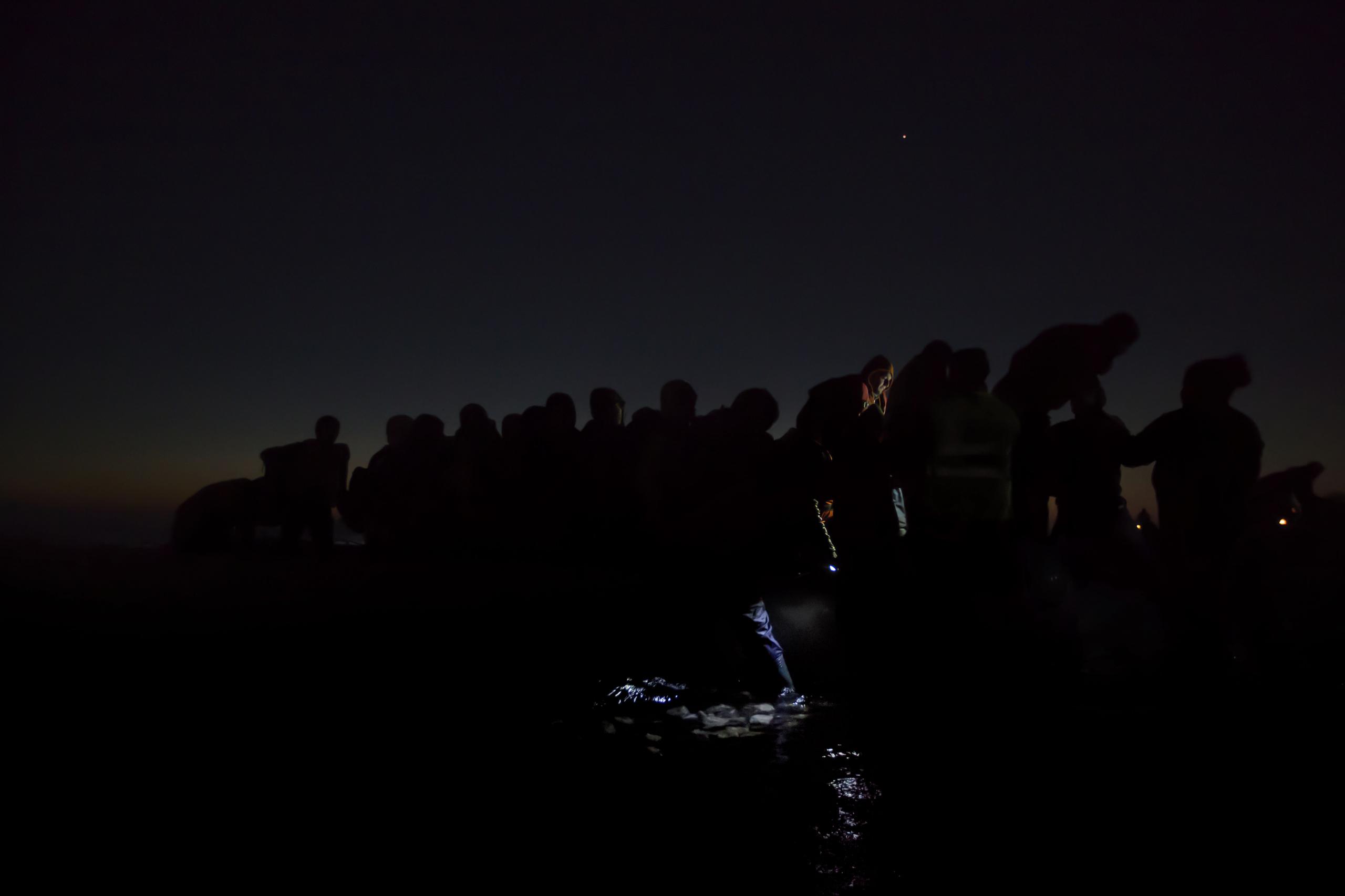
Spot News, first prize stories : Sameer Al-Doumy
Aftermath of Airstrike in Syria.
A man pushes his bicycle past debris following airstrikes in Hamouria, Syria.
December 9, 2015
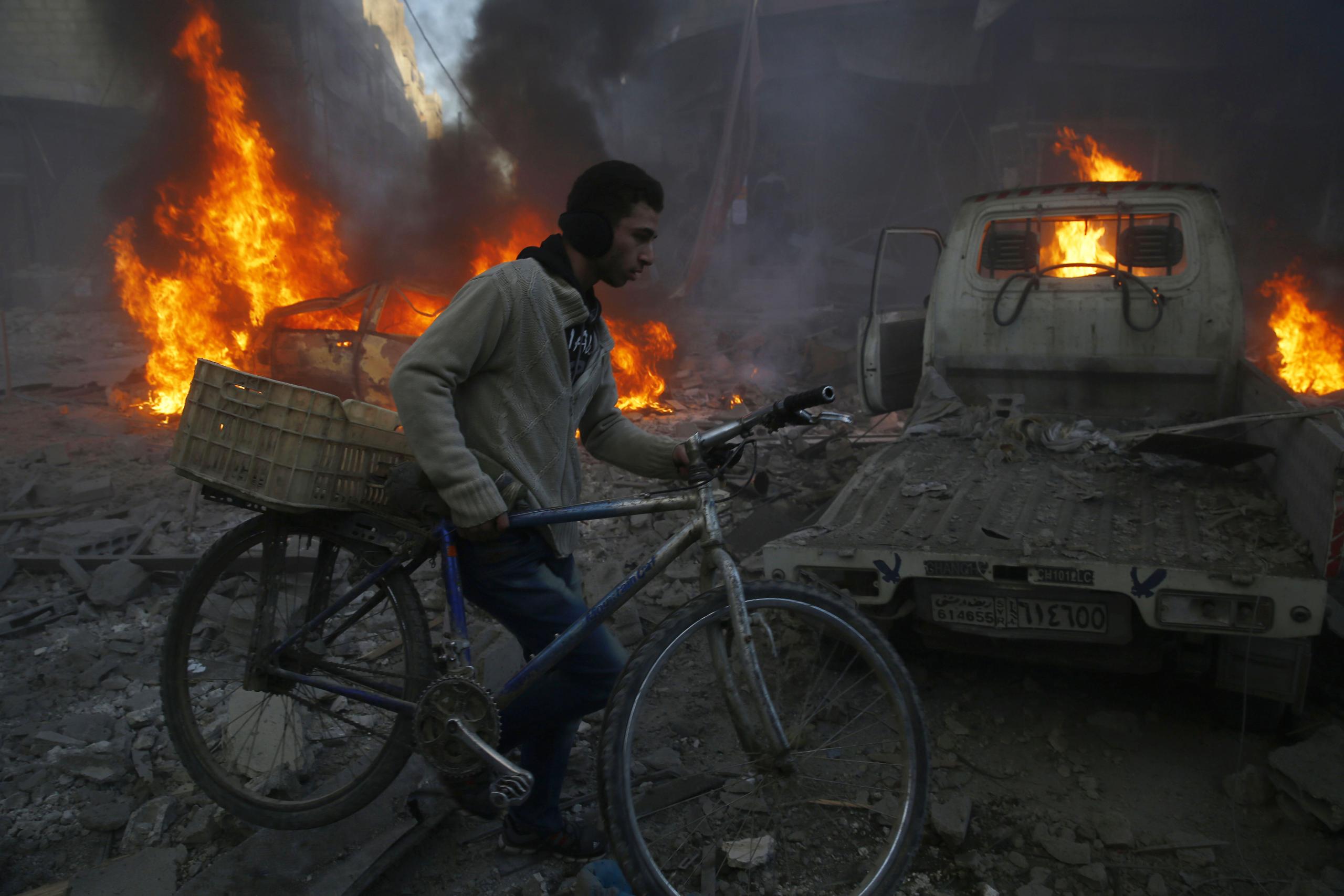
Spot News, second prize singles : Corentin Fohlen
March Against Terrorism in Paris
People demonstrate their solidarity with victims of terrorist attacks, and voice support for freedom of speech, at the end of a rally at the Place de la Nation in Paris.
January 11, 2015
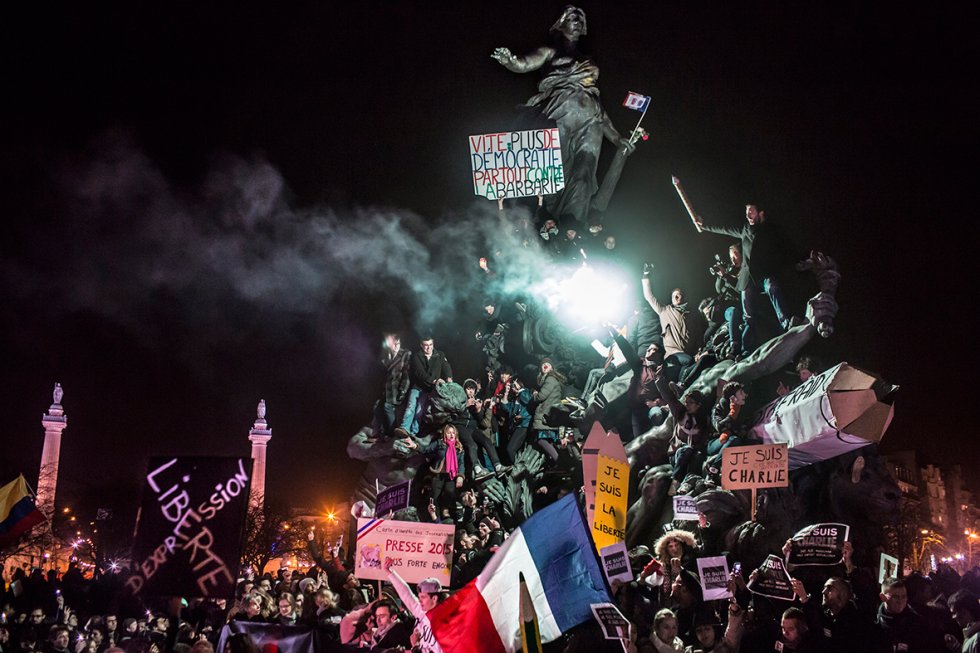
People, 1st prize singles : Matic Zorman
Waiting to Register.
Refugee children covered in rain capes wait in line to be registered at a refugee camp in Preševo, Serbia. October 7, 2015
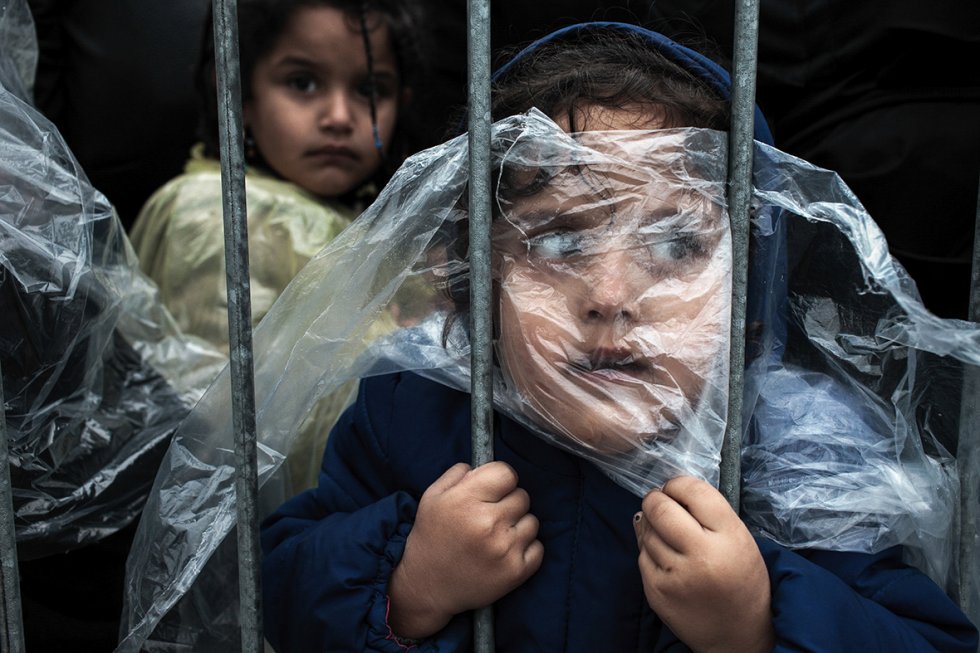
Nature, 1st prize singles : Rohan Kelly
Storm Front on Bondi Beach.
A massive shelf cloud moves towards Bondi Beach.
November 6, 2015
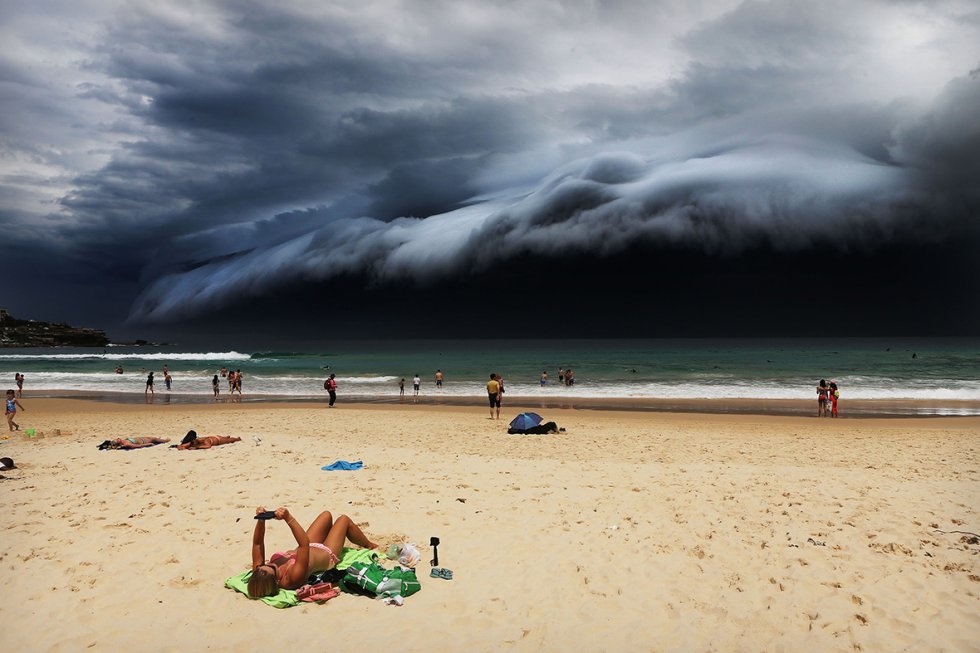
Nature, second prize singles : Anuar Patjane Floriuk
Whale Whisperers.
A humpback whale and her newborn calf swim near Roca Partida, the smallest island of the Revillagigedo archipelago, off the Pacific coast of Mexico.
January 28, 2015
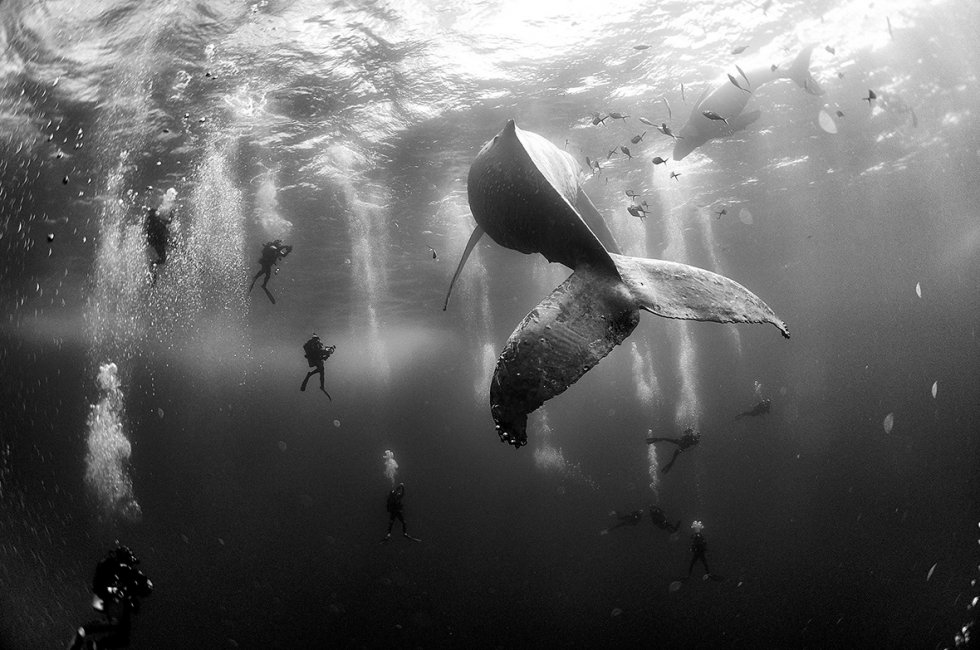
Nature, third prize singles: Sergio Tapiro
The Power of Nature.
Colima Volcano erupts with rock showers, lightning, and lava flows in Mexico.
December 13, 2015
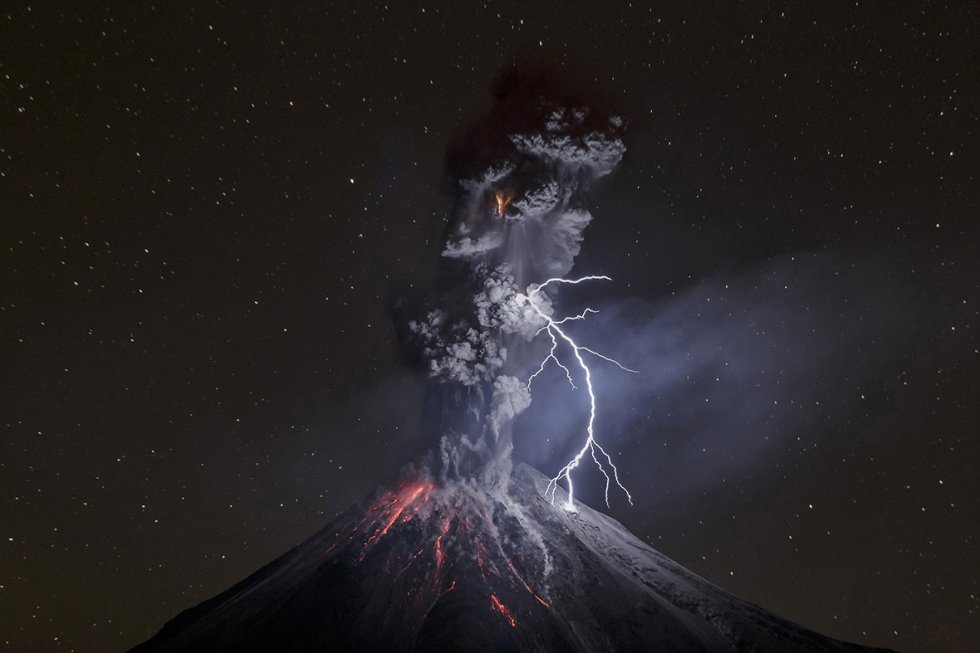
The winning pictures are published in a yearbook available in multiple languages.
All the informations about the upcoming 2016 exhibition tour.
John Oliver Is Urgently Asking America To #MakeDonaldDrumpfAgain
“Our main story tonight – and I cannot believe I am saying this – is Donald Trump.” Those were the introductory words of Sunday evening Last Week Tonight host John Oliver. On last Sunday’s segment, John Oliver decided that it was time to take on billionaire Republican candidate Donald Trump.

As Oliver pointed out, the show mostly tried to ignore Donald Trump until then. Yet as Trump has now won three states and recently received an endorsement from Chris Christie with polls that show him leading most Super Tuesday states, things are getting more serious than expected.
“At this point, Donald Trump is America’s back mole: it may have seemed harmless a year ago, but now that it’s gotten frighteningly bigger, it is no longer wise to ignore it,” said Oliver.
After running clips of Trump’s supporters describing their favourite candidate as an “independent” and “tough” man who “tells it like it is”, Oliver claims to understand why Trump’s supporters seem to like him so much through his polished image of an entertaining, truthful and successful candidate.
He decides to take a closer look at those qualities, starting with Trump’s said honesty. First noting that “PolitiFact checked 77 of his statements and rated 76 percent of them as varying degrees of false”, Oliver then specifically underlined a false statement made by Trump who claimed to have turned down an invitation to appear on Last Week Tonight “four or five times.”
“It was genuinely destabilizing to be on the receiving end of a lie that confident,” said Oliver. “I’m not even sure he knows he is lying, I think he just doesn’t care about what the truth is.”
He continued to dismantle Trump’s seeming qualities by calling into question the claim he made to Fox News that he was “self-funded” and contributed around twenty-five million dollars to his own presidential campaign.
“While it is true that he hasn’t taken corporate money, the implication that he has personally spent $20-25 million is a bit of a stretch, because what he’s actually done is loaned his own campaign $17.5 million, and has personally given just $250,000,” said Oliver before adding: “And that’s important because up until the convention, he can pay himself back for the loan with campaign funds.”
Oliver then tackles Trump’s biggest selling point – his business success and wealth. He admits that Trump is indeed very wealthy but “not only received a multi-million dollar inheritance from his father, but he’s also lost a huge amount.”
While keeping in mind Trump’s own words that says: “If I put my name on something, you know it’s gonna be good”, Oliver brings attention to Trump’s past business failures: “His name has been on some things that have arguably been very un-good, including Trump Shuttle, which no longer exists; Trump Vodka, which was discontinued; Trump Magazine, which folded; Trump World Magazine, which also folded; Trump University, over which he’s being sued; and of course, the travel-booking site GoTrump.com.”
He also points out Trump’s lack of financial instinct back in April 2006 – just before the entire housing market collapsed – when Trump told a CNBC interviewer :”I think it’s a great time to start a mortgage company” adding that “the real estate market is going to be very strong for a long time to come.”
He goes on to note Trump’s many political inconsistencies. After questioning Trump’s silence about former Ku Klux Klan Grand Wizard David Duke’s support for his campaign, Oliver reminds his audience of his particularly troubling declaration on killing the family members of terrorists to defeat ISIS, a rather worrying image of “the frontrunner for the Republican nomination advocating a war crime,” said Olivier.
According to Oliver, Trump may appear invincible and almost magical since he “has spent decades turning his own name into a brand synonymous with success and quality, and he’s made himself the mascot for that brand.” The mascot is supposed to symbolize wealth, power and success, but “it’s time to stop thinking of the mascot and start thinking of the man,” said Oliver.
He therefore concludes that people seem to automatically associate the name – or brand – “Trump” with wealth and success, hence the urgent need to separate the word from the man. In fact, it turns out that the name “Trump” is an alteration of what was once “Drumpf”, which is rather ironic considering Trump’s tweet mocking Jon Stewart’s Jewish family for having changed their name.

“Fucking Drumpf!” Oliver exclaimed. “Drumpf is much less magical.” Referring to Trump’s tweet on Jon Stewart’s name, Oliver added: “He should be proud of his heritage!”

Oliver thus asks his audience and America to make Donald Drumpf again to break the spell of his brand name. He announces the launch of the website http://donaldjdrumpf.com/ where people can purchase some #MakeDonaldDrumpfAgain hats and download a Drumpfinator Chrome extension that will replace ‘Trump’ with ‘Drumpf’ wherever it appears in their browser.


“If you are thinking of voting for Donald Trump, the charismatic guy promising to ‘Make America Great Again,’ stop and take a moment to imagine how you would feel if you just met a guy named Donald Drumpf: a litigious, serial liar with a string of broken business ventures and the support of a former Klan leader who he can’t decide whether or not to condemn,” said Oliver. “Would you think he would make a good president, or is the spell now somewhat broken?”
By Pauline Schnoebelen
Source: YouTube
Scientists Successful In Growing “Mini-Stomachs” That Produce Insulin When Transplanted
A team of researchers has succeeded in creating mini insulin-producing organs that can be implanted into a diabetic animal to maintain glucose levels, progress towards what they consider the future of regenerative medicine.
The cells the researchers found are best at producing insulin when reprogrammed are pylotic cells — cells from the lower region of the stomach, called the “pylorus region.”
They think that these cells work best because they are naturally very similar to the pancreatic beta cells that normally carry out this function. What they do better than other cells is respond to high glucose levels by producing insulin to normalize blood sugar levels.

What the researchers first did with their mouse test subjects and what they think could be done for people are two different things.
With mice, the researchers initially reprogrammed cells in their stomachs with conversion genes to become beta cells, and then they destroyed the mice’s pancreatic beta cells, forcing their bodies to rely solely on the artificially created ones. While control mice died within eight weeks, mice possessing the reprogrammed cells lived as long as they were tracked (up to six months).
The researchers also found that pyloric cells had the advantage of naturally renewing themselves — when the researchers destroyed the cells they had created, new ones grew and produced insulin.

This transgenic experiment would not be used as treatment for diabetes in people, however. Instead, the researchers set about to try something new: they grew tiny stomachs to produce insulin.
They took pyloric tissue out of mice, reprogrammed it to express beta-cell functions, grew the cells in the form of a tiny ball of insulin-producing “stomach,” and put the ball back into the mice. When they destroyed these mice’s pancreatic cells, the engineered organ implants compensated, maintaining normal levels of glucose in five of 22 test animals.
Senior author Dr. Qiao Zhou of the Harvard University Department of Stem Cell and Regenerative Biology explained how they will bridge the gap from the current study to an application for people.
“We are working on two approaches to move this forward toward therapeutics,” Zhou told The Speaker. “One approach is to create engineered human stomach mini-organs from human iPS cells (induced pluripotent stem cells made from the fibroblasts of individual patients) that can produce insulin in culture, followed by transplantation. The other approach is to culture human stomach stem cells from patient biopsy samples, reprogram them into beta-cells in culture, and then transplant them back to the same person. We are making progress on both fronts.”
He also noted the promise offered by engineered therapeutic organs in general.
“The regenerative medicine field has been moving towards a very exciting future of making and engineering entire organs with a complex assembly of different cell types. It is still early but with enormous potential. These organs could replace or supplement the normal function of organs in our body that are failing due to disease or aging. Genetic and bioengineering could be further applied to endow the organs with new function. I believe this is very much the future of regenerative medicine.”
The researchers said they were excited about their success. Replacing insulin-producing pancreatic cells is something science has been trying to do for decades.
“The most surprising part of the study for me is that there are cells residing in your stomach that share surprising features with pancreatic beta-cells,” said Dr. Zhou. “They do not naturally make insulin, but I believe therapeutic methods can be found to “tickle” them to do so. If successfully, it will provide an new approach to treat diabetes.”
Images: The report
Report: Ariyachet et al.: “Reprogrammed stomach tissue as a renewable source of functional beta-cells for blood glucose regulation,” published in Cell.
Link to report
Crimean Tatars – The Struggle Of A Nation
It is three o’clock at night. Your front door is being knocked on heavily. Not completely awake, you come closer to the door. When you open it, the soldier who breaks in tells you to get prepared to leave the house in 15 minutes. You are not aware that these are your last minutes in the house which you have been living in for years…
The entire Crimean Tatar population, an ethnic Turkic nation living in Crimea for centuries, were exiled from their own land on May the 18th , 1944 by Joseph Stalin on charges of collaborating with the Germans in WW2. After a very secret and planned preparation, soldiers carried out the order of Stalin to clear all Crimea from Crimean Tatars in one night.
Nearly half of the population, (approximately 125000 of 250000 consisting only women, kids and elderlies since the men had been fighting for Red Army,) starved or died of various illnesses due to the inhumanly conditions in livestock wagons which were carrying them to the deserts of Middle Asia and Ural Mountains.
All Crimean Tatar houses were given to Russian or Ukrainian settlers and village names were changed into Russian in one night. Books, cemeteries, anything related to Crimean Tatar existence were destroyed brutally by Soviets.
Crimean Tatars in exile were forced to work in Kolhozes, were prohibited from leaving their location, speaking their native Crimean Tatar language even mentioning their ethnic identity and their dreadful exile experience by strict rules, disobedience against which resulted in death or imprisonment in labour camps not less than 10 years.
After Stalin’s death, all nations who were exiled by Soviets, were allowed to return to their homeland except Crimean Tatars. Only after a long and painful struggle Crimean Tatars gained the right to rejoin their beloved homeland in 90’s.
Starting a new life in their own homeland was not easy as they were exposed to intense suppression from Russians and Ukrainians who captured their land and houses half a century ago.
After 72 years, Crimean Peninsula still remains its exclusive statue which can not be shared by Ukraine and Russia as Crimean Tatars, the indigenous inhabitants of Crimea, are too few in number to claim their independence in the land of their own ancestors.
Letter by Emre Seven
How to Incorporate a Business in Canada
Incorporating is fairly simple in Canada. It requires that you fill out a form and pay $200.
If you want a numbered company (a company that doesn’t have a name — they just give you a number) it’s easier.
If you want a corporate name, it’s more difficult because you can’t have the same name as someone else.
If you want a name:
- File a NUANS name search (costs $20). NUANS will email you their results for the name you esquire about.
- Use your NUANS search email to file a form with Corporations Canada for pre-approval of a corporate name (they’ll say the name is Ok to use before you pay $200 with your application to incorporate.
- If they reject your pre-approval, you can do some research by searching the internet for the websites of the similar names that came up on their check and by calling the provincial registrars for these names to ask them what those companies are doing (and if they even exist still). You just submit another application for pre-approval (the same form you just submitted) but with a letter (a regular text file from your computer — or is it a pdf of your text file? I forget) explaining the research you did and why they should let you use the name.
- Once Corporations Canada emails you saying your name is pre-approved, you can submit your application to incorporate and they won’t reject your application based on the name.
Now you’re back at the step you would be at if you didn’t want to check your name for pre-approval (and risk them rejecting your $200 application because the name isn’t acceptable) or if you just want a numbered company.
This is the step where you incorporate: Go to the Corporations Canada website (this page – click here) and select “Incorporate a business.” Fill out the fields — they ask for your address and phone number, and (if you have one) the two numbers Corporations Canada emailed you in your name pre-approval email. The final step is to give them the credit card / interact information so they can take payment. Now you wait for them to approve or reject your application.
NOTE: Rejection of a name for pre-approval doesn’t mean you can’t get the name. They rejected mine initially because there were three names that were somewhat similar. I searched the companies out online and called the provincial registrars in two provinces where the names were registered (the rejection letter has the information about the provinces) and just asked them what sort of business the companies were doing. The three companies were distinct in how people would understand their names and they did different business, I thought. One was no longer active, it seemed, according to the registrar. One wasn’t doing any public business (just a general holding company), it seemed. I reapplied with a short letter explaining my research and Corporations Canada approved the new application.
BC Budget Does Little For Rural Communities, Stikine MLA Says
Criticism of the new B.C. budget was provided at the provincial legislature today by the MLA of Stikine, who said the many of the main points of the budget meant little to rural and northern communities.
“This is not a budget for rural communities,” Douglas said. “I will be saying ‘No’ to this budget.”
In rural and northern communities, MLA Doug Donaldson said, there is little home transfer to speaker of, so the new house transfer tax break will have no real impact on most residents there. province-wide, transfers account for only 20 percent of the market, he noted, and in the communities he represented the percentage was considerably smaller.
People renovate their homes and live in them while they renovate in most rural and northern communities, Douglas explained, and while there are many people looking to buy houses in his area, they were mostly first time home buyers who would be buying new houses.
The MLA took issue with two main points: the budget included no home energy improvements — a serious challenge in his area is heating houses, many of which have poor insulation, he said — and there were no breaks for drivers.
B.C. Hydro rates have increased 28 percent under the current premier, in order for the company build more electricity generating capacity to service the dramatic population increase in the Lower Mainland and to maintain and upgrade its equipment. However, there was no provision for improving energy efficiency or in any way reducing heating costs.
Drivers are paying 30 percent more for ICBC since 2011, Douglas pointed out. In rural and northern communities, almost all transportation is necessarily by personal vehicle. He gave the example of a resident needing to use a basic medical diagnostic tool such as an MRI, for which they would need to travel to a larger town or city.
However, Douglas said, while the B.C. budget was funded by 95 million in profits from ICBC, there was nothing specifically for those who paid into that funding source.
Government Wants More Immigrants Without Language Proficiency, Immigration Minister
The requirements people must meet before they can become Canadian citizens, such as English or French proficiency, are to be reduced, according to the Canadian government, in order to make it easier for foreigners to obtain citizenship.
Immigration Minister John McCallum said Thursday that the government intended to make changes to the Citizenship Act of Canada:
“We are in general trying to reduce the barriers people have to overcome to become a citizen,” McCallum said in an interview on CBC News Network’s Power & Politics.
Currently, those wishing to become Canadian citizens must first prove proficiency in either English or French by taking a language test.
While changes the government may make to the language test “have not been announced yet,” McCallum said, the Liberals are “certainly not ditching it.” He did not specify what changes would be made, but did mention reducing the age requirement for language proficiency.
Currently, the age requirement is set at 64. It was raised from 55 in 2014 in an attempt to reduce the number of immigrants who could not communicate in English or French.
The 2014 bill that raised the age for language proficiency were protested by some M.P.s in B.C., such as Sukh Dhaliwal and Jenny Kwan. Some of B.C.s politicians, particularly those in areas where many people speak languages other than English, want the language requirement scrapped altogether.
The immigration minister also said that the government planned to make it impossible to take away Canadian citizenship for any reason.
Fuel Prices Expected To Swing Up And Down $20 A Barrel This Year
The average price of retail diesel has dropped to a record low — under $2 a gallon for the first time in 12 years, and gas is currently around $1.72 a gallon.
The prices are tied to a huge supply of diesel and a warmer winter, according to the Energy Information Administration analysit Sean Hill.
The near future of the oil market is expected to involve a return to stability after a period of wide fluctuation, according to Goldman Sachs Group Inc.
They are calling the near future of oil “trendless.” Prices will swing up and down between $20 a barrel and $40, possibly dipping down into the teens, until a price is found at which supply and demand are brought back into balance.
The “trendless” period is expected to last 6-9 months, according to the experts.
Seven Trucks Shot In Past Two Nights On Highway 75
Wal-Mart officials have said that three trucks were shot Sunday night and three more were shot on Monday night while travelling along a stretch of highway in Oklahoma.
In addition, one other commercial vehicle — reported to have been a Swift truck — and one personal vehicle were hit over the last two nights.
The shooter is suspected to have been firing from the west side of the U.S. 75 highway between 106th Street North and 156th Street North, according to the Washington County Sheriff’s Office, which is assisting in the investigation led by the Tulsa County Sheriff’s Office.
The trucker drivers involved reported hearing loud noises at that point along the highway between the hours of 8:30 and 11:30 p.m., which they thought was something hitting their vehicle or a noise from the truck, but did not realize it was gunshots until they found the bullet holes later on.
The trucks were travelling between Wal-Mart Stores Inc.’s distribution center near Ochelata and other destinations when they were struck.
UPDATE: Two 14-year-old boys have been arrested in connection with the truck shootings, Oklahoma’s News On 6 has reported, who, according to the organization’s sources, admitted to doing “target practice.”
By Andy Stern
For ongoing coverage, refer to Tulsa World
BC To Collect Data On Real Estate Buyer Nationality
Announced in the B.C. Budget Speech Tuesday, data about real estate buyer nationality will again be collected in the province due to widespread concern about the effects of foreign investment.
Such data was collected in the past, but was stopped in 1998. Since that time, house prices have skyrocketed in B.C., particularly in areas in and around Vancouver. Many Canadians are blaming foreign investment and mass immigration for the changes, but data that would furnish a practical assessment of the situation is lacking.
Finance Minister Mike de Jong made that announcement in Tuesday’s Budget Speech that the province would again be collecting nationality data starting this summer.
However, de Jong noted, nationality will only be collected when the buyer is not a citizen or resident of Canada. He also commented that foreign ownership of Canadian real estate is legal and even “encouraged” by the government.
The relevant portion of the Budget Speech:
https://www.youtube.com/watch?v=-dkLfoJ8rQQ
How Will The New Mortgage Rates Effect The Housing Market?
In an effort to deal with “house prices that have been elevated,” the Canadian federal government raised down payments on houses over $500,000. Analysts have questioned whether the new policy will have any meaningful effect on the market at all, while many Canadians say the change only makes it harder for new Canadian home buyers, and may make it easier for what many are pointing to as the main cause of the ongoing massive increases in house prices — foreign ownership.
Beginning this month, the Canadian Mortgage and Housing Corporation requires a 10 percent down payment on any portion of a mortgage it insures above half a million dollars. Any portion up to $500,000 will require the same down payment as before — 5 percent.
How this change effects house buyers will likely depend on where those house buyers live. In Canada overall, the average price of a home is under $500,000. Not counting Greater Vancouver and Greater Toronto, where prices have shot up 23-35 percent in the last five years, the average house costs $337,000, and if you exclude B.C. and Ontario, the price is under $300,000. In these regions, a $500,000 house would be a more expensive dwelling and would be in excess of what they typical home buyer would be looking for.
Read more: Home Prices Up 12% In Canada, But Down When BC And Ontario Factored Out
However, in Toronto and around Vancouver, the average is above $500,000. Even the Fraser Valley now has an average house price of half a million dollars. In these regions, all home buyers — even new families starting out — will be effected by the change.
There seems to be a discrepancy between what government officials and housing analysts are saying about the new mortgage rate and what Canadian citizens are saying about it, however.
The federal government said of the matter that they wanted to make sure they created an environment that protects home buyers by insuring that they have enough equity in their homes.
Analysis have said that the change will effect a tiny fraction of Vancouver home buyers, and that a strong B.C. economy and high employment rate are the cause of the huge housing price changes in Vancouver.
However, reading the responses to these statements (try either of the above links, or any other news story on housing prices) the most prevalent thread is one pointing at something the federal government and real estate analysts are not mentioning: foreign buyers, especially Chinese buyers.
The majority of commenters on news stories on this subject are to voice this concern. Yet it is not raised by local or federal politicians.
They have also pointed out that increasing the price for houses at this level will only make it more difficult for local buyers to own a house, and won’t effect foreign buyers who are already coming with a down payment that is larger than the required minimum.
What do you think, Canadians? How will the new mortgage rates effect the housing market?
Photo: Brian Fagan
